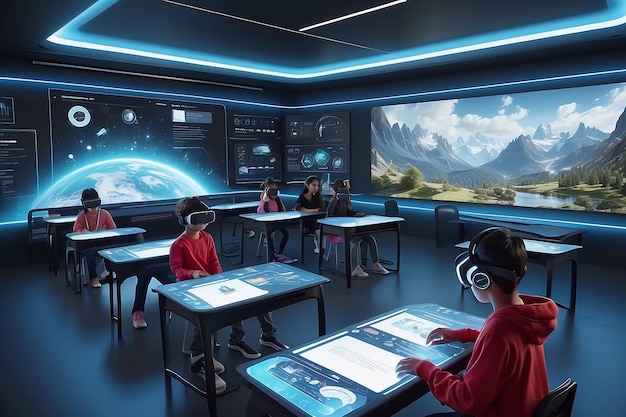AI in Education: Reshaping Curriculum Development for the Future

Artificial intelligence (AI) is poised to revolutionize curriculum development in education by offering personalized learning experiences, automating administrative tasks, and providing data-driven insights to enhance teaching and learning outcomes.
The landscape of education is rapidly evolving, and at the forefront of this transformation is the impact of artificial intelligence on curriculum development. As we look towards the future of education, AI promises to reshape how we teach, learn, and prepare students for a world increasingly driven by technology.
The Evolution of Curriculum Development in the Age of AI
Curriculum development has traditionally been a human-driven process, relying on the expertise of educators and subject matter experts. However, the advent of artificial intelligence on curriculum development is ushering in a new era where data-driven insights and personalized learning experiences are becoming increasingly prevalent. This evolution promises to create more effective and engaging educational programs for students of all backgrounds.
Traditional Curriculum Development: A Review
For decades, curriculum development followed a linear model, often involving needs analysis, goal setting, content selection, instructional design, and evaluation. This process, while effective, can be time-consuming and may not always cater to the diverse learning needs of individual students.
The Rise of AI in Education
AI offers unprecedented opportunities to personalize education. By analyzing student data, AI algorithms can identify learning gaps, tailor content, and provide customized feedback. This level of personalization was previously unachievable at scale, making AI a game-changer in curriculum design.

- AI-powered learning platforms can adapt to each student’s pace and learning style.
- Automated assessment tools provide instant feedback, allowing students and teachers to track progress in real-time.
- AI can generate personalized learning paths based on student data and learning objectives.
In conclusion, the integration of AI into curriculum development represents a significant shift from traditional methods. While human expertise remains crucial, AI tools offer powerful capabilities to enhance personalization, efficiency, and effectiveness in education.
Personalized Learning: AI’s Key Contribution
One of the most significant contributions of artificial intelligence on curriculum development is its ability to facilitate personalized learning experiences. By leveraging data and algorithms, AI can tailor educational content to meet the unique needs and preferences of each student, fostering a more engaging and effective learning environment.
Adapting Content to Individual Needs
AI algorithms can analyze a student’s learning history, performance metrics, and even emotional state to determine the most appropriate content and delivery methods. This ensures that each student receives a learning experience that is tailored to their specific needs and preferences.
AI-Driven Tutoring Systems
AI-powered tutoring systems provide students with personalized support and guidance. These systems can answer questions, provide feedback, and offer additional resources to help students master challenging concepts.
- AI tutoring systems can operate 24/7, providing students with support whenever they need it.
- These systems can adapt to each student’s learning style and provide customized feedback.
- AI tutors can identify learning gaps and provide targeted interventions.
In summary, AI-driven personalized learning has the potential to revolutionize education by creating more engaging, effective, and equitable learning experiences for all students. By tailoring content and providing personalized support, AI can help each student reach their full potential.
Automating Administrative Tasks in Curriculum Management
Beyond personalized learning, artificial intelligence on curriculum development also offers opportunities to streamline administrative tasks. Automating these tasks can free up educators’ time and allow them to focus on teaching and student interaction, ultimately enhancing the overall quality of education.
AI for Grading and Assessment
AI-powered grading systems can automate the assessment process, providing teachers with instant feedback on student performance. This not only saves time but also ensures consistency in grading.
Curriculum Planning and Scheduling
AI algorithms can analyze curriculum requirements, student enrollment data, and teacher availability to create optimized class schedules. This can help schools make the most efficient use of their resources.
- AI can automate the process of creating and updating course catalogs.
- Intelligent scheduling tools can minimize conflicts and maximize resource utilization.
- AI can generate reports on curriculum effectiveness and identify areas for improvement.
To conclude, AI’s ability to automate administrative tasks in curriculum management significantly reduces the burden on educators, allowing them to focus on their core mission: teaching and inspiring students. By streamlining processes and optimizing resource allocation, AI contributes to a more efficient and effective educational system.
Data-Driven Insights: Enhancing Teaching and Learning Outcomes
The use of artificial intelligence on curriculum development provides valuable data-driven insights that can significantly enhance teaching and learning outcomes. By analyzing student performance data, AI algorithms can identify patterns and trends that inform instructional decisions and improve the overall quality of education.
Identifying At-Risk Students
AI can analyze student data to identify those who may be at risk of falling behind. This allows teachers to intervene early and provide targeted support to help these students succeed.
Optimizing Instructional Strategies
By analyzing student engagement and performance data, AI can help teachers identify the most effective instructional strategies. This enables them to tailor their teaching methods to meet the needs of their students.

- AI dashboards provide teachers with real-time insights into student progress and performance.
- AI algorithms can identify learning gaps and suggest targeted interventions.
- Data-driven insights can inform curriculum revisions and improvements.
In conclusion, data-driven insights enabled by AI offer valuable tools for educators to improve teaching and learning outcomes. By identifying at-risk students, optimizing instructional strategies, and informing curriculum revisions, AI contributes to a more effective and equitable educational system.
Addressing Challenges and Ethical Considerations
While the potential benefits of artificial intelligence on curriculum development are substantial, it’s crucial to acknowledge and address the challenges and ethical considerations associated with its implementation. Ensuring fairness, transparency, and responsible use of AI is paramount to avoid unintended consequences.
Data Privacy and Security
AI systems rely on vast amounts of student data, raising concerns about privacy and security. It is essential to implement robust data protection measures and ensure compliance with privacy regulations.
Bias and Fairness
AI algorithms can perpetuate existing biases if they are trained on biased data. It is crucial to carefully evaluate and mitigate biases in AI systems to ensure that they are fair and equitable for all students.
The Role of Teachers in an AI-Driven World
As AI takes on more administrative and instructional tasks, it is important to redefine the role of teachers. Teachers should focus on providing personalized support, fostering critical thinking, and nurturing students’ social-emotional development.
To summarize, while AI offers immense potential for transforming education, it is essential to address the associated challenges and ethical considerations proactively. By prioritizing data privacy, mitigating bias, and redefining the role of teachers, we can ensure that AI is used responsibly and ethically to enhance learning for all students.
The Future of Education: A Collaborative Approach
The future of education lies in a collaborative approach that leverages the strengths of both humans and machines. By combining the expertise of educators with the capabilities of artificial intelligence on curriculum development, we can create a more effective, engaging, and equitable learning environment for all students.
AI as a Tool for Teachers
AI should be viewed as a tool to augment and enhance the capabilities of teachers, not as a replacement for them. Teachers can use AI to personalize instruction, automate administrative tasks, and gain data-driven insights.
Continuous Learning and Adaptation
The field of AI is rapidly evolving, so it is important for educators to stay informed about the latest developments and adapt their practices accordingly. Continuous learning and professional development are essential for leveraging the full potential of AI in education.
Equity and Access
It is crucial to ensure that all students have equal access to AI-powered educational resources, regardless of their socioeconomic background or geographic location. Addressing the digital divide and providing equitable access to technology is essential for realizing the transformative potential of AI in education.
| Key Point | Brief Description |
|---|---|
| 💡 Personalized Learning | AI tailors content to individual student needs for better engagement. |
| ⏱️Automation | AI streamlines tasks like grading and scheduling. |
| 📊 Data Insights | AI provides valuable insights for targeted support and improved teaching. |
| 🔒 Ethical Concerns | Addressing data privacy, bias, and the changing role of teachers is crucial. |
FAQ
▼
AI analyzes individual student data such as learning history and performance to tailor content and pacing to their specific needs, creating a customized learning experience.
▼
AI can automate tasks like grading assignments, scheduling classes, and generating reports, freeing up educators’ time and resources to focus on student interaction and teaching.
▼
AI algorithms analyze student engagement and performance data to identify at-risk students, optimize instructional strategies, and make data-informed decisions about curriculum improvements.
▼
Ethical considerations include protecting student data privacy, mitigating biases in algorithms, and redefining the role of teachers in an AI-driven educational environment to ensure fairness and equity.
▼
Educators can work to bridge the digital divide by providing equal access to technology and resources, regardless of socioeconomic background, ensuring that all students can benefit from AI in education.
Conclusion
In conclusion, the integration of artificial intelligence on curriculum development holds immense promise for transforming education. By embracing a collaborative approach that leverages the strengths of both humans and machines, we can create a future where education is more personalized, efficient, and equitable for all.





